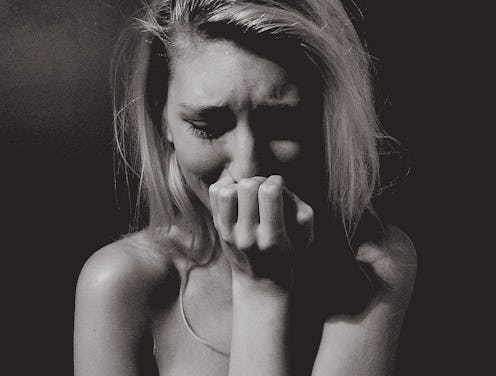
If there's one emotional event that I'm not terribly fond of, it's crying in public. Crying just makes everything more awkward, in my opinion. Maybe I shouldn't be so hard on those who show their tears, though, as a new study has found that, yes, crying can make you feel better — it just takes a little time for the improved mood to kick in. I guess it's time to let those tears loose!
I have to admit that yes, I usually do feel better after crying; I'm also guess that a lot of you would probably say the same. Interestingly, though, surprisingly little is actually known about why we cry or the purpose that crying serves. That's what promoted researchers from the University of Tillburg to start looking into how crying makes people feel. "While some researchers see it as a cry for support, comfort or help, others believe the main role of crying is to relieve emotions," the researchers wrote in their final report. They also noted that previous studies about crying all had different results, leading them to then lay the foundations of their own research.
In order to examine the immediate effects and long term results of crying, the research team asked 60 participants to watch two sad movies. 28 of the study participants did actually cry during the films, while the other 32 did not. All of them were asked to rate their mood at three different intervals: Immediately after the films ended, 20 minutes afterwards, and 90 minutes afterwards.
The non-criers reported their moods to be "unchanged and unaffected" at all three intervals. The criers, however, told a different story: They reported feeling not so great immediately after the films were over, though they also reported having returned to their normal emotional state 20 minutes later. At the 90-minute interval, though? That's where it gets interesting: The criers reported feeling better than they did before they had even started watching the films, suggesting that for people prone to tears, a good cry really can make you feel better — as long as you're willing to wait a little bit. "After the initial deterioration of mood following crying, it takes some time for the mood not only to recover but also to be lifted above the levels at which it had been before the emotional event," lead researcher Asmir Gračanin said in the report.
Although the results are fascinating, the researchers don't have an explanation as to why those who cried during the movies felt better than they did before; as such, it looks like this study has lead to even more questions about the effects of crying. However, other studies have pointed to other health benefits of crying, so it seems like a pretty worthwhile practice. Here are four other reasons it might be worth having a good cry every now and again:
1. Crying Releases Stress
Tears that are the result of intense emotion were found in a 2011 study to release stress hormones, which results in your body getting rid of the the toxins stored up inside. How cool is that? Crying could be the next trendy detox, but without all the juicing.
2. Crying Kills Pain
The act of crying releases endorphins in your body, which are those pleasure-inducing hormones known to reduce pain. Given that endorphins also make you feel pretty great in general, it might also explain the positive effects of crying found in the current study.
3. Tears Are Germs Worst Enemies
Fun fact: Tears are natural germ killers. They contain antibacterials that kill 90 to 95 percent of all forms of bacteria in a record amount of time — only five to 10 minutes!
4. Crying Can Improve Your Vision
Crying also has some positive physiological benefits for your eyes, as the increased lubrication helps to relieve dryness and blurred vision in your eyes. Think of them as natural eye drops.
Images: Shandi-lee/Flickr; Giphy (4)